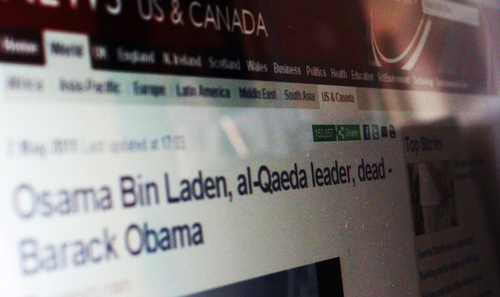
06 Feb Killing Osama Bin Laden
For all those Americans who were alive and old enough to comprehend exactly what was going on, 9/11 will be a day they will never forget. It was a day which pioneered the war on terror, and it forever changed the way we live. From increased safety measures nationwide, to military operations that were put in place to protect people and nations out of terrorists, it was an event which changed the entire world.
Following the attack on the twin towers in Manhattan, President George W. Bush resisted the war on terror, declaring in an address to congress on September 20, 2001, that “the Taliban. . .will hand over the terrorists, or they will share in their fate.” He reiterated that this war on terror wouldn’t end until those encouraging those initiatives, in whatever part of the planet they lived, had been stopped.
When Barack Obama became the 44th president of the USA and began his term in office on January 20, 2009, he took up the baton, pledging in his campaign to find Osama bin Laden. Accordingly, he was the president that gave the army orders to proceed with an operation to catch and kill the famed Al-Qaeda leader. This was eventually realized when, on May 1, 2011, Obama declared to the world that the surgery had been effective and bin Laden had been killed. Throngs of people gathered outside the White House gates, shouting in triumph and joy at the news.
But this had been in the works for quite a long time. The process of gathering information had been happening for decades, and also in the months leading up to the assault, the United States had watched and tracked carefully, attempting to pinpoint bin Laden’s location. When they were certain as they are, Admiral Mike Mullen led a clinic attack on a pseudo compound in the desert in Nevada. Only 1 week following that event, the chance came to take it out.
President Obama and his advisors gathered in the Situation Room (known as the Sit Room) in the White House to deliberate for a last time, talking about the prospect. Obama felt that it was time to develop some conclusion, and following dinner with his family that day, he went to his research. When later reflecting on those hours, he said he knew he had looked at each bit of information there must be had, that he had studied it from every angle. And he added that it’s sometimes like that where you do some praying.
The next morning, on April 29, 2011, he gave the orders which the assignment was a move, and the ball should be put in motion. Because of the character of the assignment, it had been completely top secret and not many people knew what was being tried. And so it started. On May 1, Obama gathered with those who knew about the assignment, those who’d planned and discussed for such a long time, to watch it unfold. They could watch the action via camera as it moved, step-by-step. Obama mirrored:
“There are moments in your presidency in which you truly do put politics aside. Surely, we thought the simple fact that if there was a failure here, it could have catastrophic consequences for me politically….But, I inform you, the only thing I was thinking about throughout this whole venture was, ‘I really wanna get these guys back home safe.'”
And it was tense. Before our men actually went into the chemical, they had a drawback, and everyone sitting in that room watching it play out was worried. One of the helicopters crashed, which did not look like a good omen for the assignment. But, following the men entered the compound, Obama and the others finally heard the code word to get bin Laden (Geronimo). And then they heard “Geronimo KIA,” for “killed in action.” Back home, as all this played out for all those sitting in the Sit Room, Vice President Joe Biden was rotating a finger rosary on his finger.
Although this narrative reflects the dedication and leadership of two presidents of our nation, it absolutely speaks to the dedication, bravery, and devotion of the military men and women of this nation. They work tirelessly to prioritize and protect the freedoms we enjoy here, and that sometimes means risking their own lives.
If people consider motorcoaches, they usually think about traveling groups, but we do a lot more than that. One of those professional privileges we have would be to transfer members of our military. Whether we’re helping in transporting troops from one location to another, or even shuttling people at an important event, we’re proud to help support this nation’s department of defense. Please call us now to tell us how we can help with any forthcoming military transport demand!
(The information for this article came from the following source:
https://m.youtube.com/watch?v=0dBLoZqLb_M)


